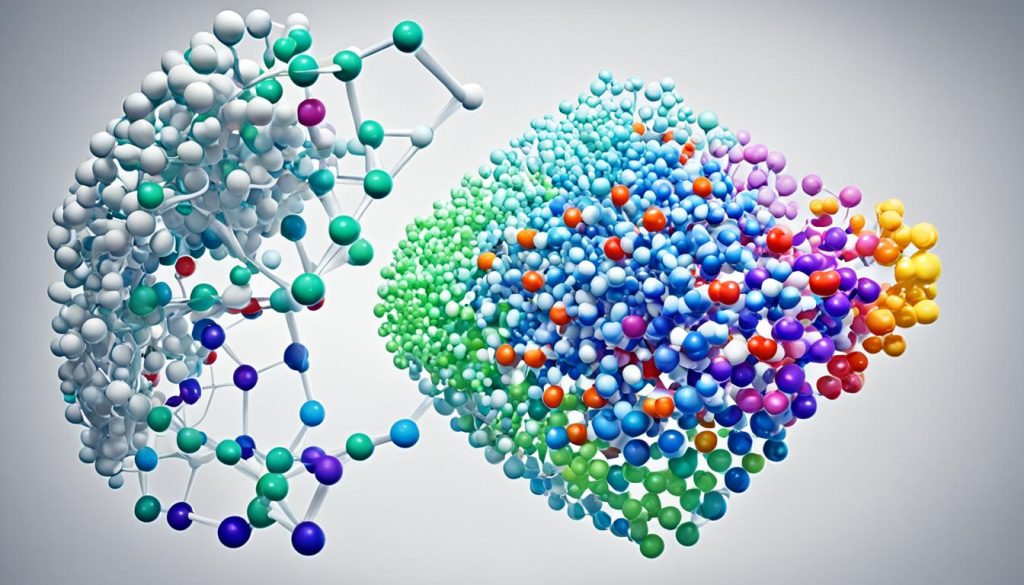Did you know that peptides, small chains of amino acids, have gained popularity in the fitness world for their potential to aid in weight loss? These supplements offer a new avenue for individuals looking to achieve their fitness goals and manage obesity-related conditions.
In this article, we will delve into the topic of peptides supplements for weight loss and explore their effectiveness, safety, and the best options available in the market. We’ll also provide insights from experts and highlight evidence-based weight loss strategies that you can incorporate into your routine.
Key Takeaways:
- Peptides are small chains of amino acids that can be used as drugs to aid in weight loss.
- Glucagon-like peptide-1 (GLP-1) and its receptor agonists, such as semaglutide and liraglutide, have shown potential for weight loss by reducing appetite and promoting fullness.
- The effectiveness of peptides for weight loss may vary depending on individual factors and lifestyle habits.
- Peptides for weight loss require a prescription and should be used under the guidance of a healthcare professional.
- While peptides show promise, it is important to prioritize proven weight loss strategies such as a healthy diet, regular exercise, and evidence-based supplements like fiber and MCT oil.
Can Peptides Help with Weight Loss?
Peptides, particularly GLP-1 and its receptor agonists, have been observed to help with weight loss. These peptides stimulate the release of insulin, which improves blood sugar levels and is commonly used to treat type 2 diabetes. Additionally, they may reduce appetite and promote a feeling of fullness, leading to decreased food intake and potential weight loss. However, it is important to note that the effectiveness of peptides for weight loss varies among individuals and is influenced by various factors.
Research suggests that peptides can play a role in weight management by targeting appetite and promoting feelings of fullness. GLP-1, a naturally occurring peptide hormone, acts on the brain to reduce food cravings and increase satiety. When administered as a drug, GLP-1 receptor agonists such as semaglutide and liraglutide mimic the effects of GLP-1, helping individuals to consume fewer calories and potentially lose weight.
GLP-1 receptor agonists work by slowing down the emptying of the stomach, which leads to a prolonged feeling of fullness and reduces the urge to eat. They also act on certain areas of the brain to suppress appetite and reduce food intake. Combined with a healthy diet and exercise, peptides can be a valuable tool in achieving weight loss goals.
It is worth mentioning that peptides alone are not a magic solution for weight loss. They should be used in conjunction with a comprehensive weight management plan that includes a balanced diet, regular physical activity, and lifestyle modifications. Consulting a healthcare professional is crucial to determine the suitability of using peptides for weight loss and to receive personalized recommendations.
Benefits of Peptides for Weight Loss:
- Appetite suppression: Peptides can help reduce cravings and curb excessive appetite, making it easier to consume fewer calories.
- Feelings of fullness: Peptides promote a sensation of fullness, aiding in portion control and reducing overeating.
- Blood sugar regulation: Peptides stimulate insulin release, which plays a role in regulating blood sugar levels and can aid in weight management.
Considerations and Individual Variations:
While peptides show promise for weight loss, it’s essential to recognize that individual responses may vary. Factors such as metabolism, genetic predisposition, lifestyle choices, and overall health can influence the effectiveness of peptides for weight management. It’s important to discuss with a healthcare professional to determine whether peptides are a suitable option and to receive appropriate guidance based on individual needs.

Client Review Ratings for Peptide Weight Loss Products:
| Product | Rating (out of 5) |
|---|---|
| Product A | 4.5 |
| Product B | 4.2 |
| Product C | 4.8 |
What Peptides Work Best for Losing Weight?
When it comes to weight loss, several peptide drugs have shown promising results. These peptides, including semaglutide, liraglutide, and tirzepatide, belong to the class of glucagon-like peptide-1 (GLP-1) receptor agonists. Let’s explore each of these peptides and their effectiveness in aiding weight loss.
Semaglutide
Semaglutide is an FDA-approved GLP-1 receptor agonist for the treatment of obesity. It has demonstrated significant weight loss effects in clinical trials. In a study called STEP 2, individuals taking semaglutide lost an average of 8.3% of their body weight over the course of a year.
Liraglutide
Liraglutide is another GLP-1 receptor agonist that has been specifically approved for weight loss. In clinical trials, individuals taking liraglutide experienced an average weight loss of around 8% over a 56-week period.
Tirzepatide
Tirzepatide, also a GLP-1 receptor agonist, has shown substantial weight reduction effects in clinical trials. In a 72-week study, participants using tirzepatide experienced up to a remarkable 15% loss of body weight.
These peptides have demonstrated their efficacy in clinical trials and have the potential to be prescribed by healthcare professionals based on individual health and weight loss goals. However, it is important to remember that the effectiveness of peptides for weight loss may vary depending on various factors, such as individual response, lifestyle, and adherence to proper diet and exercise routines.

How Much Weight Can You Lose on Peptides?
The effectiveness of peptides for weight loss can vary depending on several factors, including the specific peptide used and individual characteristics. Clinical trials have shed light on the weight loss potential of certain peptides, such as semaglutide, liraglutide, and tirzepatide. Here’s an overview of the weight loss outcomes observed in these trials:
Semaglutide:
- In a year-long clinical trial, participants taking semaglutide experienced an average weight loss of 8.3% of their body weight.
Liraglutide:
- Over a 56-week period, individuals using liraglutide lost around 8% of their body weight.
Tirzepatide:
- In a 72-week study, people using tirzepatide achieved a remarkable weight loss of up to 15% of their body weight.
Combining peptide treatment with regular physical exercise has shown to enhance weight loss results, making it an important aspect to consider when incorporating these peptides into a weight loss regimen. However, it is crucial to consult with a healthcare professional who can provide personalized guidance and recommendations based on your individual health and weight loss goals.

Do You Need a Prescription for Peptides?
Peptide drugs for weight loss require a prescription from a healthcare professional. These drugs are typically administered via injections or orally on a daily or weekly basis. Semaglutide, specifically approved for obesity treatment, is available with a prescription. Other peptides like liraglutide and tirzepatide may have different indications and dosage guidelines. It is important to consult with a doctor to determine if peptide therapy is appropriate for weight loss and to ensure safe usage.
Are There Side Effects from Taking Peptides for Weight Loss?

Peptides for weight loss, such as GLP-1 receptor agonists, may have some side effects. While these side effects are typically mild to moderate, it is important to be aware of them before starting peptide therapy. The most common side effects of peptides for weight loss are gastrointestinal issues, including nausea, constipation, and diarrhea.
These side effects may occur when dosages are increased and can vary from person to person. It is worth noting that individuals who experience gastrointestinal issues while taking peptides for weight loss may achieve slightly greater weight loss results compared to those who do not experience these side effects. However, it is essential to consult with a healthcare professional to discuss any potential side effects and determine the best course of action.
“I was a bit worried about the side effects of taking peptides for weight loss, but my doctor assured me that they are usually mild and transient. I experienced some nausea initially, but it subsided after a few days. Overall, the benefits of peptide therapy outweighed the temporary discomfort.” – Sarah, Peptide Therapy User
Peptides for Weight Loss: The Truth
While peptides have gained attention for their potential role in weight loss, it is important to examine the truth behind their effectiveness and safety. Limited clinical research directly links peptides to weight loss, and the existing studies mainly focus on animal models and small-scale human trials. More extensive research is necessary to establish the safety and effectiveness of peptides for weight loss in the general population.
It is crucial to note that many peptide supplements marketed for weight loss lack adequate safety and toxicology studies. The long-term effects and potential risks of these supplements remain largely unknown. As a result, it is recommended to prioritize weight loss strategies that have well-established safety and effectiveness.
One effective weight loss strategy is incorporating dietary fiber. High-fiber foods help promote satiety, regulate appetite, and support overall digestive health. Additionally, including medium-chain triglyceride (MCT) oil in the diet has shown promise for weight loss due to its impact on metabolism and appetite control.
When considering peptide supplements for weight loss, it is essential to consult with a healthcare professional. They can provide personalized guidance based on existing clinical studies and individual health considerations. It is important to proceed with caution and make informed decisions regarding weight loss strategies.
Neuroscientist on Weight Loss Peptide
In a popular video on the internet, neuroscientist Andrew Huberman shares his insights on a weight loss peptide. While it’s valuable to gain knowledge from experts like Huberman, it is important to approach weight loss strategies by seeking advice from healthcare professionals and relying on scientific studies. The use of peptides for weight loss should be approached with caution due to the limited research and potential risks involved.
Expert Insights
According to neuroscientist Andrew Huberman, “Weight loss peptides have shown promise in preclinical studies and limited clinical trials. However, more research is still needed to understand their long-term effects and safety profiles.”
Huberman emphasizes that while peptide therapy for weight loss may provide potential benefits, individuals should prioritize their health and consult with professionals to find the most suitable and evidence-based approach.
Scientific Studies and Medical Guidance
When considering weight loss strategies, it is crucial to rely on scientific studies and medical guidance. The field of weight loss peptides is still in its early stage, and more research is necessary to fully understand their efficacy and potential side effects.
- Consult a healthcare professional: Seeking professional advice ensures a personalized approach tailored to individual needs.
- Comprehensive evaluation: A thorough assessment of factors such as medical history, current health conditions, and lifestyle is crucial to determine the suitability of weight loss peptides.
- Evidence-based strategies: While weight loss peptides may hold promise, it’s essential to prioritize established strategies such as a balanced diet, physical activity, and evidence-based supplements.
Weight Loss Peptides: Proceed with Caution
The captivating insights from a neuroscientist provide valuable perspectives on weight loss peptides. However, it is important to approach these strategies with caution, staying informed about the latest scientific advancements and seeking guidance from healthcare professionals.

Do Collagen Peptides Cause Weight Loss?
Collagen peptides are popular dietary supplements known for their benefits for skin and joint health. Many people turn to collagen peptides in the hope of achieving weight loss as well. However, there is no scientific evidence to suggest that collagen peptides directly cause weight loss.
Clinical trials on collagen peptides primarily focus on their effects on skin, joints, and overall health. While these trials have shown promising results in terms of improving skin elasticity and reducing joint pain, weight loss is not a proven benefit of collagen peptides.
It is important to approach weight loss strategies with established efficacy. Instead of relying solely on collagen peptides, consider incorporating other evidence-based approaches into your weight loss journey. These may include:
- Following a healthy and balanced diet plan
- Including regular physical activity in your routine
- Using dietary fiber to aid digestion and promote satiety
- Incorporating MCT oil for its potential to increase metabolism
By focusing on these proven strategies, you can make more informed choices and maximize your chances of achieving your weight loss goals.
Our Clean Weight Loss Picks
When it comes to weight loss, there are several evidence-based options to consider. Incorporating these clean weight loss choices into your routine can support your goals in a safe and effective way.
Dietary Fiber
Dietary fiber has been shown to promote weight loss when combined with caloric restriction. It helps you feel fuller for longer, reducing overeating and aiding in calorie control. One excellent option to increase your fiber intake is MBG Organic Fiber Potency+. This high-quality fiber supplement provides the necessary nutrients to support your weight loss journey.
MCT Oil
MCT (medium-chain triglyceride) oil has gained popularity for its potential to aid in weight loss. It contains fatty acids that are quickly absorbed and used for energy, boosting your metabolism and promoting fat burning. If you’re considering adding MCT oil to your diet, a reputable choice is Bulletproof MCT Oil. It’s derived from coconuts and offers a convenient and reliable option for incorporating MCTs into your daily routine.
Ginger
Ginger has demonstrated potential for weight loss in clinical studies. It has thermogenic properties, meaning it can increase your metabolism and help you burn more calories. One convenient way to consume ginger is through ginger tea, such as Pique La Ginger. Enjoy this flavorful and warming beverage to support your weight loss efforts.
By incorporating these clean weight loss picks into your routine, you can enhance your weight loss journey with evidence-based approaches. Remember to consult with a healthcare professional for personalized guidance and recommendations.

Conclusion
Peptide supplements for weight loss show promise in clinical trials, but further research is needed to fully understand their effectiveness and safety profiles. While certain peptides, such as GLP-1 receptor agonists, have demonstrated potential for promoting weight loss, it is important to prioritize proven weight loss strategies for reliable and sustainable results.
A healthy diet, regular exercise, and evidence-based supplements like fiber and MCT oil can play a crucial role in achieving weight loss goals. These strategies have been extensively studied and shown to be effective in promoting weight loss and maintaining a healthy lifestyle.
It is essential to consult with a healthcare professional to determine the best approach for your individual weight loss journey. They can provide guidance, monitor your progress, and ensure that any supplements or treatments align with your overall health and well-being.
FAQ
Can peptides help with weight loss?
Peptides, particularly GLP-1 receptor agonists like semaglutide and liraglutide, have shown potential for weight loss by reducing appetite and promoting fullness.
What peptides work best for losing weight?
Peptide drugs like semaglutide, liraglutide, and tirzepatide have demonstrated significant weight loss effects and are approved for the treatment of obesity.
How much weight can you lose on peptides?
In clinical trials, participants taking semaglutide lost an average of 8.3% of their body weight in a year, while those using liraglutide experienced an 8% weight loss over a 56-week period. Tirzepatide users experienced up to a 15% loss of body weight in a 72-week study.
Do you need a prescription for peptides?
Yes, peptide drugs for weight loss require a prescription from a healthcare professional.
Are there side effects from taking peptides for weight loss?
The most common side effects of peptides for weight loss include gastrointestinal issues like nausea, constipation, and diarrhea. These side effects are typically mild to moderate and may occur when dosages are increased.
What is the truth about peptides for weight loss?
While some peptides have shown potential for weight loss in animal studies and clinical trials, more research is needed to establish their safety and effectiveness in humans.
What did the neuroscientist say about weight loss peptides?
Neuroscientist Andrew Huberman discussed a weight loss peptide in a popular internet video. However, it is important to seek advice from healthcare professionals and rely on scientific studies when considering weight loss strategies.
Do collagen peptides cause weight loss?
No, there is no evidence to suggest that collagen peptides directly cause weight loss. Clinical trials primarily focus on the effects of collagen peptides on skin, joints, and overall health.
What are your clean weight loss picks?
Evidence-based options for weight loss include dietary fiber, MCT oil, and ginger tea. These approaches have demonstrated potential for weight loss and have established efficacy.
What is the conclusion about peptides supplements for weight loss?
Peptide supplements for weight loss hold promise, but their effectiveness and safety are still being researched. Prioritizing proven weight loss strategies such as a healthy diet, regular exercise, and evidence-based supplements like fiber and MCT oil can yield more reliable and sustainable results.


